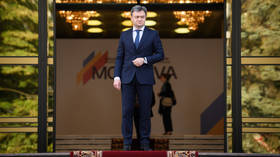American yes vote on bailout shifts focus to global economy
The House of Representatives of the U.S. Congress voted for the ‘Paulson plan’, aiming to improve the American economy. 263 Congressman voted in support of a plan for the allocation of 700 billion dollars on buying illiquid assets from the countries banks.
171 congressmen didn’t support the document, which needed a simple majority of voices to be accepted.
The bailout will now be sent to President Bush for his certain signature.
It’s the second time the legislation for the bailout was put before the House of Representatives. On September 29, they voted against the plan, but said it could still pass.
Although the U.S. House of Representatives passed the economic rescue plan in a climactic vote on Friday, many doubt it will change the fate of the global economy, with the effects flowing on to Russia.
Selling a plan with a $700 billion price tag may not be easy, but the White House worked overtime to convert enough Congressmen to salvage the bill. And it worked. It’s approval may help repair the crisis of confidence, but Ron Smith, Head of Research at Alfa Bank doubts it will have an ultimate impact on a slowing global economy.
“The markets are now leaning towards that there is going to be a sharp slowdown, even if the package is passed and has worked. We are still going to go through 12 to 24 months of very slow economic growth and therefore the markets are going down.”
Optimists, including Deutsche Bank's Chief Economist, Yaroslav Lissovolik, though, remain bullish on Russia’s prospects, sayings it’s likely to weather the current financial-markets storm.
“I think Russia’s resilience in terms of growth rates is quite significant, more significant certainly than most emerging markets. And I think that even next year we still can see growth rates of 6% or more.”
While growth rates may remain relatively healthy for now, it is not a question of if – it’s a question of when Russia will feel the punch.
Investors have been fleeing Russia and depositing money in U.S. Treasury bills. Russia’s financial establishment still insists U.S. financial “irresponsibility” and Anglo-Saxon unregulated capitalism is to blame for the current crisis.
If it comes through relatively unscathed, it will have all the more reasons to flex its economic muscles in the future.
Somewhere between the $700 Billion bailout and a depression
Russian investors look to U.S. to sort out its financial turmoil











